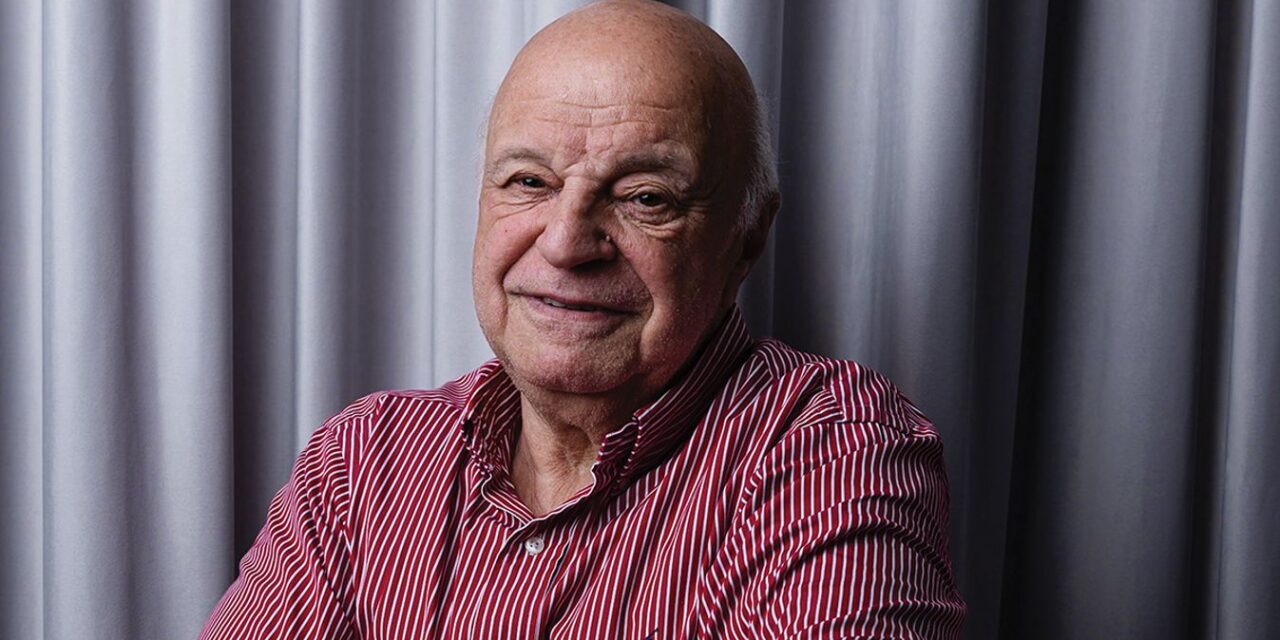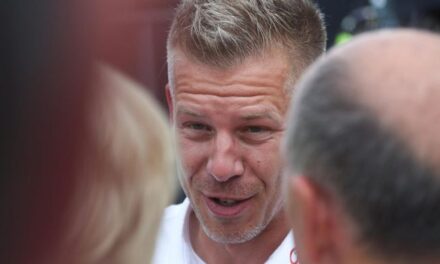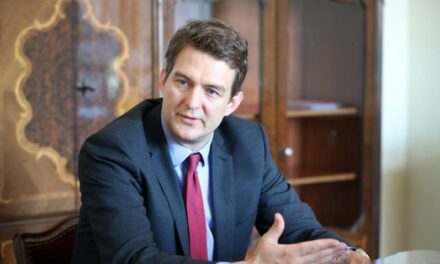He has been interested in foreign policy since childhood, he never wanted to be a politician, and he does not talk about domestic politics. All he says to his critics is: do it after him. What about agency charges? Can we avoid nuclear war? What does the visit of the Chinese president mean? Life journey interview and foreign policy analysis with 75-year-old György Nógrádi.
If I were to randomly approach ten people on the street and ask them to name a security policy expert, nine of them would definitely say György Nógrádi.
That must be a foreigner! (Laughs) By the way, our country can boast several excellent security policy experts: József Horváth, Attila Demkó, Bálint Somkuti - just to name a few.
In any case, you undoubtedly became the first really well-known security policy expert. Why?
I do not know. I have been interested in this since I was a child and I am happy to be able to do this. I completed the international course at Közgáz, then the history course, I did my candidate's studies, then the highest school in NATO at the time, then the German General Staff Academy. In 1997, I became a habilitated university professor, later head of department.
We always hear statements about foreign policy, never about domestic policy.
I have always been interested in foreign policy. I have not liked domestic politics since my youth. At that time, giving a lecture on domestic politics was life-threatening, criticism was not tolerated. When I talked about the Moroccan ruler, it didn't particularly excite anyone, but if I had told them how I evaluated one or another Hungarian leader, they would have definitely blown the fuse. Today, some foreign policy issues are at least as divisive as domestic ones. Today, everything in the world is divisive. Foreign policy issues cross over into domestic issues and result in family disputes.
Do you too?
My wife watches almost all of my performances and then corrects what I didn't say well. Even a single word. He reads my writings and corrects them.
Didn't you want to be a politician?
Never. I was once called State Secretary, but I did not consider myself suitable for it. I wanted to deal with foreign policy and security policy as an expert.
His professional career is surrounded by a lot of criticism and doubt.
Somewhere there is a biography about me in which about two out of three data are not good. They didn't even find out when I was in college. They found almost nothing about my career so far. Recently, I have received two serious criticisms. According to one of them, I am not using the pronouns "a" and "that" correctly, because I am saying "the Ukrainians" and "the Russians" respectively. I don't know why, but unfortunately it is. The other serious criticism was when a nice lady approached me on the street saying that she was majoring in Turkish and wanted to draw my attention to the fact that I was not pronouncing the name of the Turkish president, Recep Tayyip Erdoğan, correctly. He was absolutely right, but unfortunately I haven't said it well since then.
Do you not consider the claims that several elements of his biography are lies to be taken seriously as criticism?
No. The accusations began with the fact that I lied because I am not an adviser to the Austrian Minister of Defense. In response to a journalist's inquiry in this regard, the professor of the University of Graz, the chairman of the advisory board, immediately confirmed that he has been considered a member of the advisory board since the regime change. Of course, the aforementioned journalist never brought the letter down. Another such claim was that I have no publications - even though I have many publications and sometimes write several books a year. And so on.
A recurring criticism is that you were an agent, and you still are today.
This is an interesting story. Ten or fifteen years ago I sued for this and won because there was no evidence that I had ever been an agent. There has been no such evidence since. Recently, the same person who then came forward with this claim again. I asked several friends what they advised me to do; they all advised me not to deal with him and not to waste my time on this man, on litigation with him. I took their advice.
So you're not the much talked about Agent Raguza?
Several people have said and written about me, but I don't know about it. If they could show me a paper that I signed as Raguza... By the way, I asked for the documents about me, there is no file or report written by me. I've never written a report in my life. Of course, I was also an "American agent": after university, I wanted to work at the Foreign Office, but they didn't let me because I was considered unreliable, because I had relatives living abroad. I'm used to such accusations. Today, these lies are mainly spread by those who envy me. My answer to this is: don't be jealous, let them do it after me!
Am I jealous?
Of course, I started from a courtyard apartment next to Városliget, where there was no hot water or regular heating. I was 17 years old when we moved to the Kacsóh housing estate, and I was shocked that there was hot water, a bathroom and a balcony. Today, I have reached the point where I am invited to many places, willingly and well paid for my performances, I am not surprised that some people hate me for this. But that didn't come out of nowhere either, I had to work hard to achieve it. At the beginning, I gave seven lectures in a day and a half, which I would not be able to do today.
Are you getting old?
Yes. I see this mostly from driving: I love driving a car, but in the past I was constantly looking at the landscape while driving, now almost only at the road. Age also affects my way of seeing: as I get older, I try to think conceptually. Facts and events are still important, but I am increasingly interested in strategic goals. For example, what is Iran's strategic goal and what is Israel's.
What does it feel like to be 75 years old?
I'll only be 75 in a few days, so this is a cheeky question! (Laughs) I'm extremely ashamed, but as long as I've been alive, I feel good. I never felt like I was in a mental crisis or traumatized.
Apparently, he does not slow down, he travels the country and even the world.
I give about 160 lectures a year. Now in forty days I will have 30-35 performances at home and abroad. From there I go to the Highlands, then to Serbia, then to Transylvania. I try to go wherever I am called. I don't like to give up anything, it's an honor for me when people are interested in what I think about the world.
Is it the result of conscious construction that it is popular in virtual space in addition to radio and TV?
No. I am happy to give an interview to anyone. Even if I've never heard of that person before. I am not choosy. Being asked is an honor and not a chore.
You also have to prepare for lectures and interviews.
I study for two or three hours every day. This morning I got up at 6:30 a.m., watched the German news station, Morgenmagazin, and then sat down to read.
One of his recurring phrases is that he watches German TV all the time.
I start my mornings with this on weekdays, and on weekends I watch the evening political talk shows.
Which?
I can access more than a hundred German-language channels, but mainly ARD and ZDF.
So you get information from German TV...
...and from the German papers.
Yet he says that the German media is biased.
The German media is excellent, except when it comes to Hungary, migration or the Russian-Ukrainian war. He is not telling the truth about these issues. The German analyzes are very good, one of the channels has an all-night foreign policy debate program where the leaders of the parties sit down and debate - you can learn a lot from it. But just as in the German media, there is a kind of duality in German foreign policy: interest politics and emotional politics. The foreign minister politicizes based on his emotions, while the chancellor is based on interests.
We talk about successes, results, envy. Did you achieve all this alone?
Yes and no.
György Nógrádi is a one man show, isn't he?
There is no such thing as a one man show. As a child, I received a lot of help from my parents, who were simple traders and were never close to politics. Their only goal was for their one-eyed child to study, and they supported this in every way, including taking him to private English lessons. I don't do what I do alone today either. My wife always supports me in everything. If I didn't get breakfast, a clean shirt, it would be difficult to start watching TV early in the morning. I try to devote two to three hours a day to writing. My book on Angela Merkel is coming out soon, and I've just started another one, in which I examine the state of the world, more than a hundred pages are ready.
Doesn't it need to be rewritten from time to time?
You have to rewrite it every day. But I try to shed light on the processes, not analyze the daily happenings.
If there are processes, where is the Russian-Ukrainian war going?
In a very bad way. I watch what is happening on the front every day, I read the reports of the Russian and Ukrainian generals. It's interesting how much they contradict each other, but I wouldn't even dare to say that we find the truth between the two, because we don't know what to compare the middle to. A good example of this is the report on the number of dead on the front: the two sides provide contradictory data, it is obvious that everyone is lying. At the same time, we can be sure that the war causes enormous damage. I recently discussed with one of the richest people in Austria, he is already over 80, but he is active and travels the world. He also recently went to Kiev, where the Ukrainians asked him to help produce artificial limbs, because many people no longer have arms or legs. Conclusions can be drawn from this.
The full interview can be read on Mandine!
Featured image: Mandiner/Árpád Földházi













